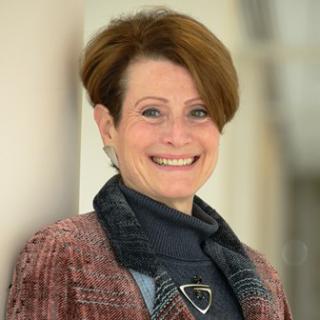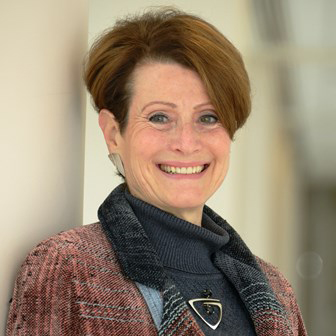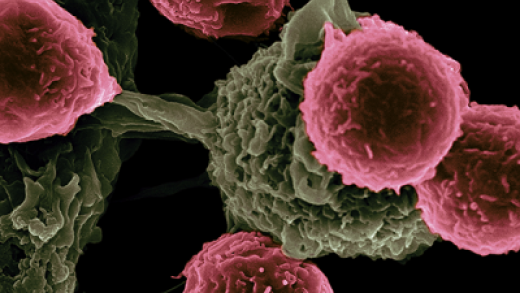
Dinah S. Singer, Ph.D.
- Center for Cancer Research
- National Cancer Institute
- Building 10, Room 4B-17
- Bethesda, MD 20892
- 240-276-6180
- dinah.singer@nih.gov
RESEARCH SUMMARY
Dr. Singer’s research has provided novel insights into the molecular mechanisms that regulate MHC class I transcription in vivo. Her most recent studies have identified 1) the mitotic bookmark, BRD4, as a novel kinase that regulates early transcription, linking mitosis and transcription and 2) the transcription factor, TAF7, as a checkpoint regulator of early transcription.
Dr. Singer's research program is focused on interrogating the regulatory networks governing transcription to generate an integrated understanding of the interplay between promoter elements and transcription complexes that establish appropriate regulation of gene expression across diverse cellular and tissue environments.
Areas of Expertise

Dinah S. Singer, Ph.D.
Research
Molecular Mechanisms Regulating Gene Expression
The long-term goal of our research program is to define the molecular mechanisms regulating gene expression. To that end, the lab focuses on three main areas: 1) analyses of the factors and regulatory mechanisms that govern transcription initiation; 2) core promoter architecture and function in constitutive and activated transcription; 3) the role of epigenetic regulation.
Transcription initiation requires the assembly of a preinitiation complex (PIC), consisting of a set of general transcription factors and RNA polymerase II. The conventional understanding is that the PIC and its components are invariant among genes and cells. However, in studies on regulatory transcription factors, we discovered that the usage of general transcription factors varies in response to extracellular signals. Thus, whereas constitutive expression of a major histocompatibility (MHC) class I gene depends on the general transcription factor TFIID, γ-interferon activated transcription depends instead on the cofactor CIITA, which bypasses the requirement for TFIID. These studies demonstrated the dynamic nature of the factors regulating transcription initiation. This point was further demonstrated in subsequent studies from the lab which discovered a novel role for the TFIID component, TAF7, independent of its interaction with TFIID. Through its interactions with the kinases that phosphorylate RNA polymerase II, TAF7 regulates early steps of transcription.
In recent studies, we discovered that BRD4, a bromodomain family member currently being tested as a therapeutic target in cancer and autoimmune diseases, is a RNA polymerase II kinase essential for transcription. Our studies demonstrated that BRD4 plays a critical role in regulating the early steps of transcription initiation, both through its direct phosphorylation of RNA polymerase II and its interactions with other components of the transcription machinery, including TAF7. These findings suggest novel ways in which BRD4 might be therapeutically targeted. Our studies have revealed the complex network of interactions that are necessary to ensure an orderly progression through each of the steps of transcription initiation. We continue to study the functions of these transcription factors.
The core promoter is defined as the segment of DNA where gene transcription initiates. A series of conserved DNA sequence elements, alone or in combination, are thought to comprise the core promoter and be essential for promoter activity. In parallel studies on core promoter architecture, we demonstrated that none of the canonical core promoter elements are necessary for expression in vivo of a major histocompatibility class I gene, challenging the prevailing dogma that these elements are critical for promoter function. Rather, each plays a distinct role in promoter activity, chromatin structure, tissue-specific expression and extracellular signaling. In those tissues where mutation of the elements affects promoter activity, it results in increased activity. These findings lead to the surprising conclusion that core promoter elements can function as negative regulators of transcription. Our current studies are focused on characterizing the mechanistic effects of the core promoter mutations on transcription.
Expression of MHC class I genes, which the lab studies as a model of genes subject to both tissue-specific and hormonal regulatory mechanisms, is regulated, only in part, by epigenetic mechanisms. Thus, nucleosomal occupancy does not regulate expression: the promoter is in an open conformation, independent of transcription. However, boundary element located 3 prime to the gene maintains the gene in a euchromatic conformation by protecting it from heterochromatinization. Ongoing studies are focused on characterizing additional epigenetic control mechanisms.
We continue to study, and integrate, each of these three areas to achieve a comprehensive understanding of MHC class I transcriptional regulation.
Publications
- Bibliography Link
- View Dr. Singer's PubMed Summary.
MYC protein stability is negatively regulated by BRD4
The Bromodomain Protein 4 Contributes to the Regulation of Alternative Splicing
Immature CD8 Single-Positive Thymocytes Are a Molecularly Distinct Subpopulation, Selectively Dependent on BRD4 for Their Differentiation
Implementing the Cancer Moonshot and beyond
BRD4 is a histone acetyltransferase that evicts nucleosomes from chromatin
Biography

Dinah S. Singer, Ph.D.
Dr. Dinah Singer has served as the Director of the Division of Cancer Biology (DCB), National Cancer Institute (NCI), National Institutes of Health (NIH), since 1999, while simultaneously serving as Senior Investigator and Chief of the Molecular Regulation Section of the Experimental Immunology Branch, NCI. In 2019, she was named NCI's Deputy Director for Scientific Strategy and Development. She came to NCI as a postdoctoral fellow in the Laboratory of Biochemistry after receiving her B.S. from the Massachusetts Institute of Technology and her Ph.D. from Columbia University. She serves on a number of scientific and advisory boards, is a member of the American Association of Immunologists and the American Association of Cancer Researchers, and has served as a Senior Science Officer at the Howard Hughes Medical Institute. Her research interests are in the areas of regulation of transcription, gene expression and molecular immunology. Dr. Singer serves in leadership positions on a variety of trans-NIH scientific and administrative committees, including NIH Common Fund initiatives. She has trained a large number of post-doctoral fellows, post-baccalaureate students and high school students who have gone on to successful scientific careers.
Job Vacancies
We have no open positions in our group at this time, please check back later.
To see all available positions at CCR, take a look at our Careers page. You can also subscribe to receive CCR's latest job and training opportunities in your inbox.

